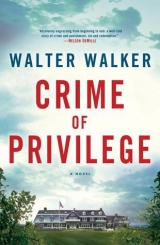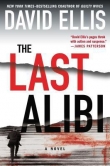
Текст книги "Crime of Privilege"
Автор книги: Walter Walker
Соавторы: Walter Walker
Жанры:
Триллеры
,сообщить о нарушении
Текущая страница: 14 (всего у книги 28 страниц)
5
.
SEAN MURPHY.
I didn’t know Sean all that well. He was younger than I was, had been in the office only two or three years, but he was already doing felonies. He had gone to law school at Northeastern and interned at the Suffolk County D.A.’s office in Boston. That was a big deal to our guys. Reid Cunningham, in particular, loved him. He called him Murph-Dog and treated him like a hound, to be loosed on the most deserving of criminals—the home invaders, child molesters, wife beaters.
“George, old buddy,” Sean said. He had something under his arm. A clipboard and some papers. He was smiling at me. He appeared to have been waiting for me to come out of Mitch’s office.
“Sean,” I said. I was prepared to walk past him, but he put out a hand.
“You’re the only one I haven’t got yet,” he said.
“For what?”
He untucked the clipboard and held it in front of him as if it was self-explanatory. He had now smiled at me for longer than he had done so in all the time we had been in the office together. “The Pan-Mass Challenge. It’s a bike race across the state. Well, not a race, exactly. One hundred and ten miles one day, ninety the next. Sturbridge to P’town, and I’m doing the whole thing. Got to get four grand in sponsors. You in?”
“You want me to sponsor your bike ride?”
All I had to say was that I was doing the ride myself, but I didn’t. I looked down the hallway instead, hoping someone else would come along and demand my attention.
“Well, not you by yourself. I’ve got every prosecutor in the office to put up a hundred bucks.”
“Everyone?”
“Everyone except Mitch. Got Cunningham and O’Connor, though. I just haven’t seen you around for a few days. That’s why I’m getting to you last.”
“You got Barbara Belbonnet?”
“Sure. It’s for a good cause, George. Children’s cancer fund.” He was beginning to falter in his bonhomie, as if he had known all along that I wasn’t going to do what everyone else had done.
I signed the form he held out to me. Pledged $100. I was now into the ride for $2,600.
1
.
KAUAI, July 2008
FLYING FROM BOSTON TO HAWAII CAN BE A VERY LONG JOURNEY if you don’t like the person you are with. Especially if that person is you.
Things did not improve once I arrived. Perhaps I thought it would be like Bermuda: hop on a motor scooter and cruise the entire island in an hour.
The airport was small, one story, and there seemed to be a dearth of walls, but there were plenty of people, and while most were in tropical clothing, virtually everyone was too intent on finding someone or someplace to help out a stranger who apparently thought he had landed in some Polynesian Mayberry.
It took me more than an hour to rent a car because I had not thought to reserve one, being under the illusion that I was going to take a taxi into town. “Which town?” the first cabdriver asked in response to my question, and I knew I was in trouble.
I told him I was staying in Princeville.
He shook his head as if there was something wrong with me. “Long way, man. Cheaper to rent da car than take da cab.”
So I did.
At least the hotel was nice, and it had a concierge named Ki’anna, a dark-hued, zaftig young woman with waist-length black hair, who assured me she knew everything that was worth knowing about the island. One thing she didn’t know was the whereabouts of a man named Howard Landry. She did the logical thing and looked him up in the phone book. No Howard Landry was listed. She went to her computer and found no reference to Howard Landry there. I would have despaired except I was beyond that point. I just stood in the open-air lobby and wondered what I was going to do next.
It was three o’clock in the afternoon. I had the option of walking a quarter-mile down to the beach, which, from where the hotel was, perched on top of a cliff, did not look as nice as a Hawaiian beach was supposed to look, or going to the pool and having a waiter bring me drinks.
I went to my room, changed into a bathing suit, and walked back to the pool, which had various arms and inlets and vaguely Asian-style pedestrian bridges and which dominated the grounds. I dove in, swam a half-dozen laps without disturbing the water for the wild children and passive adults who were using the pool for everything but swimming, then climbed out and dropped onto a lounge chair. I was in Hawaii and someone else was paying for it. I should relax, take my time. I didn’t have to do everything in an afternoon.
I closed my eyes and tried to think of Barbara Belbonnet in those long-legged, incredibly tight jeans. It did not work. My eyes would not stay closed. And the noise around me was cacophonous. Kids, swarms of them, were trying to climb on inflatable floats, an activity that seemed to require shrill yelling that cut out only when their heads went underwater. I heard parents laughing as they hung on to the edge of the pool, holding exotic drinks with straws and umbrellas and chunks of fruit impaled on little plastic swords. Everyone seemed happy but me.
I ordered a mai tai, hoping it would make me feel better. The glass came filled with ice and the drink disappeared in a matter of seconds. I ordered a Primo beer because I figured the bartender couldn’t water that, and I kept right on ordering them. I was on my fourth and thinking about Barbara without employing half as much effort as before when Ki’anna the concierge appeared at my side with a lovely smile.
“I found your guy,” she said, the smile growing even lovelier. “Whyn’t you tell me you looking for Cap’n Howie?”
2
.
THE PROBLEM WITH LOCATING CAPTAIN HOWIE WAS THAT HE was no longer where Ki’anna had known him to be. Not to worry, she assured me. She had gone to school with some of the island’s policemen and she would make some calls.
It took more than a day to find him in Poipu Beach, on the opposite side of the island, about as far away from Princeville as he could be. He had been a boat captain once. Now he ran a small condominium complex that provided units as vacation rentals.
The Hana Palms was three stories high, built of nondescript stucco and situated directly above a rocky beach. It had a parking lot in front and a small fenced-in swimming pool with a concrete deck between the lot and the building. Although there were a few cars in the lot, there did not appear to be any people around at all.
A breezeway led to the ocean side, where a green lawn looked nicer than it felt on bare feet. I retraced my steps and saw what I had missed on my first pass, a living quarters off the breezeway that doubled as an office. I opened a screen door in which part of the screen was separated from the frame. A bell tinkled above my head and a minute later a shirtless man appeared at a counter set up in the front room.
“Aloha,” he said, as if he was challenging me to a fight.
I figured I had my man. I asked if he was Cap’n Howie, just to make sure.
“Some call me that.”
“You also known as Detective Landry?”
The man’s eyebrows rose as slowly as an elevator.
I went right to the point. “Chief DiMasi told me I could find you here.”
I showed him my card. He inspected it and said, “You wanna rent a condo?” There was just a bit of hope in the question.
“No. I need to talk to you about a case you worked on years ago.”
The man put his hands on the counter and tilted back like a water skier. He had a long, lean torso, with white hairs sprouting from his chest and a few from his shoulders. He was clean-shaven, but the hair on his head was sparse and blown about at various angles. He could have been seventy. He could also have been no more than sixty. “Got telephone service. Got email. Even got teleconference things these days. No need to fly all the way here just to talk to me.”
“This is a special case.”
Howard Landry could have done a lot of things at that moment. My own options were limited. If he had told me to get lost I probably would have had to go back to Princeville and drink whatever Primos were still available at the bar. But he spared me that. He asked if I wanted a beer right there.
WE SAT ON LOUNGE chairs facing the ocean. The lawn chairs had plastic cross-straps, some of which were broken. Ahead of us, the water was rough and sapphire blue. I wasn’t used to the color. On the Cape the water tends to be green when it isn’t gray. And if it ever is blue, it is only from a distance and more cobalt than sapphire.
Landry didn’t give me a Primo, he gave me a Sam Adams. “Taste of home,” he said, as if Sam Adams was a treat for me, and we clinked bottle necks because I was still being polite.
“How long you been here?” I asked, settling in.
“Seven years,” he said without looking at me.
“Like it?”
“It’s fuckin’ paradise, isn’t it?” He didn’t sound like it was paradise.
I took a diversionary approach with my next question, trying to make nice with a statement that clearly wasn’t true. “You look pretty young for a man who’s been retired seven years.”
“Took it early. When I was fifty. I’d put in twenty-five years. Figured that was enough.”
“Your last big case was the Heidi Telford murder, huh?”
“That what you’re here about?” He still hadn’t looked at me, not since we’d touched bottles.
“Remember her father?”
“Anything New.”
“That’s right. He’s still looking.”
“Must be a nutcase by now.”
“Why do you say that?”
“You dwell that much, let it take over your life, wipes out everything else. I know. Believe me, I seen it happen.” He took a long pull on his beer. “What’s he come up with now?”
“A girl who was at the Gregory compound on the night Heidi died.”
Landry held the bottle to his lips. Without lowering it, he said, “You talkin’ about the babysitter?”
“I’m talking about one of the girls who went to the Gregorys’ to party after the race.”
The bottle stayed. Landry talked around it. “There wasn’t no party.”
“But you checked it out, didn’t you? I was told, I was told by the Gregorys themselves, that you were asking them questions.”
That threw him. Like McFetridge, he had to figure out if I was friend or foe. “I asked questions of everybody I could find.”
“Thing was, I looked in the file. Didn’t mention the Gregorys. Didn’t say anything one way or the other about a party.”
Landry lowered the bottle. He had his answer now. He turned his head and leveled his eyes on me. They were more or less a washed-out blue, and I doubted they were ever used to show merriment. “I didn’t put down every false lead I had.”
“It seemed to me you started off chasing every possible lead, whether it was false or not. Then all of a sudden you stopped.”
“I stopped because I wasn’t getting nowhere.”
I gave him a number of nods, each one meant to be a strand of false hope. I said, “It’s unusual, though, to see that much diligence up to a point, and then almost nothing after that. Wouldn’t you agree, detective?”
He obviously had not been called detective in a long time. It brought him up short. Made him blink. “You wanna tell me what in particular you’re complaining about?”
“What I just said. Looking through the file, it was almost as if something happened somewhere along the line and you decided to close down the investigation.”
“I didn’t close it. I handed it off to Pooch.”
“Detective Iacupucci.”
“That’s right. Pooch.”
“Did he do anything with it?”
“Don’t know. I left.”
“And no one ever got in touch with you after you left?”
“That’s right.”
“That strike you as curious?”
“I don’t know. I never been retired before.”
I smiled, as if he had made a good joke. He did not smile back. He was looking at me warily. It was probably the look he had developed when he was about to arrest somebody and was thinking that a weapon might get pulled. I stopped smiling. It wasn’t doing me any good.
“File lists every friend, friend of friend, waiter, shopkeeper you talked to, but you never so much as mentioned the Gregorys. Why was that, detective?”
“Case as serious as that one,” he said, “you wanna be careful what you put down. Never know who’s gonna read it.”
“You thought the wrong people might read the police file?”
“I think, counselor,” he said, dragging out the last word, paying me back for calling him detective, “things work in funny ways back in the Bay State. The Cape, in particular.”
“So you were doing a little preventive maintenance, is that it? Deciding what should go in the file and what shouldn’t.”
“Something like that.”
“And the chief, did you tell the chief what you didn’t put in the file?”
“Depends. After a while you don’t keep reporting that you got nothing to report.”
I tried to keep the questions coming. Hit him with another as soon as he was done answering the one before. It was a basic courtroom technique. “You tell him what the people at the Gregory compound said?”
“Don’t recall.”
“He told me you couldn’t find everyone who was there that night.”
“So?”
“So you couldn’t find everyone; you must have found someone.”
Landry drank his beer, staring along the barrel of his bottle while he followed the logic.
“Who did you find?” I pressed.
“Gimme some names and I’ll tell you.”
“Peter Martin; Ned, Jamie, and Cory Gregory; Paul McFetridge; Jason Stockover.”
“That it?”
“A girl named Patty Afantakis.”
He didn’t ask who she was. He asked if I had talked to her. I said I had.
“What did she tell you?”
“Nothing. She wouldn’t tell me anything, except it was clear she was there.”
He nodded. “Anybody else?”
“Patty said she was with a girl named Leanne.”
“You talk to her?”
“Nope. Haven’t found her yet.”
Landry finished off the bottle and threw it on the lawn. His own lawn. I looked at mine and saw I had barely gotten beyond the first sip.
“All right, counselor,” he said, his voice suddenly very taut, “you want to know what was going on? Fine, I’ll tell you. Ned Gregory was fucking his babysitter, that’s what. His whachucallit, his au pair. Eighteen-year-old beauty who happened to be the daughter of a guy who owns a nationwide chain of movie theaters and contributes a zillion bucks a year to all the Gregory campaigns. And Ned’s got a wife and three kids and being groomed to run for some office himself and there he is, layin’ pipe with the girl who’s supposed to be watching his children while his wife’s away. You get the picture now, pal?”
“So you were covering up.”
“You wanna call it that. It didn’t have nothin’ to do with the investigation. So you put something down in writing, all it does is embarrass the people who pay for the Little League fields and the skating rink and underwrite the summer Pops concerts, what’s it gonna get you?”
“You don’t put it down, maybe it gets you retirement in Hawaii.”
We were dangerously close to a physical confrontation. I was pointed toward the ocean, but out of the corner of my eye I could see his fist balled. I tensed. If the fist came flying, I was going to hit him over the head with the bottle I was still holding. Until then, I was going to keep looking at the water.
He elected to keep glaring at me.
I made an effort to change the subject, see if I could temper him a bit. “Sounds like there are things you miss back there,” I said.
“I miss the fucking Red Sox, that’s what I miss.” And with that, Howard Landry got up and left me.
3
.
I DROVE ALL THE WAY BACK TO PRINCEVILLE ASKING MYSELF IF I had posed the right questions, if I could have handled things better than I did, what I was going to do next. I drove past my hotel and continued to the end of the highway, where the pavement stopped and a dirt track began. Cars were parked under the trees, and I could see a smooth golden beach and water that was a much clearer blue than it had been on Howard Landry’s side of the island. I got out and found a seat on a log in the shade at the edge of the open sand.
I had made a copy of the file and brought it with me, hoping I could get Howard to go over some of the details. But I had been too direct, too confrontational, and I had learned nothing. So now I sat by myself, hugging my knees, weighing my options: try again, go home, call Barbara Belbonnet.
I looked up and down the beach and wondered if everyone there was as content as they appeared. The local families tended to keep to the shade. The mainlanders lay out in the sun and baked. Everyone went in and out of the water. Some just splashed about. Some rode waves. A few actually swam. I wondered if this was what life was supposed to be all about: a day at the beach. You lay on the sand until you got too hot to lie there anymore and then you went in the water and cooled off. Then you did it all over again. The people who were doing it seemed happy. Why wasn’t I? Lie on the beach, go in the water, go back to my room and drink beer until I passed out. Go back to work and sit in the dungeon. Hope Barbara wore those long, tight jeans again.
I stared at the water. I opened the file.
The first thing that should have been there was a crime scene log to document the arrivals and departures of personnel. There was none. By the time Landry arrived at 6:42 a.m. it was impossible to tell how many people had been there and who had done what to alter or preserve the evidence. That, I supposed, was a point he could argue. Except he could have asked; he could have tried to do a reconstruction.
I looked at his description of the body. Heidi Telford was partially hidden under lowlying branches when he first saw her, lying on her stomach, her arms pulled up, her hands clenched. There was no mention of whether she was rigid or cold, so I gathered he had not touched her. He described her dress as bunched beneath her buttocks. He described her hair as soaked with blood so thick it was like jelly.
No other blood around the body. Just in the hair. And on the back of her dress.
I flipped pages, looking for some other description. Rinaldo DaSilva said he had moved her hair, but he did not say what the wound looked like. I had to look at the pictures to see for myself how the skull had been sliced open, wider at the surface, narrower as the slice went deeper through the bone and all the way into the dura.
Sitting where I was, on a beach half a world away, more than nine years after the fact, it was easy for me to agree that the girl had been killed because she was struck with some metal object from behind. Why it had to be a golf club, I couldn’t say, but I had to presume it had something to do with the entry wound.
Hit with a golf club, found on a golf course. Except she was wearing a dress. And she had not left home to go golfing. She had left home in the evening and been found just after dawn. Whoever had killed her may have been thinking, but was not thinking too clearly.
Where is someone going to come up with a golf club as a murder weapon? If not on a course then it would have to be at home. Or at a clubhouse, maybe. Possibly the trunk of a car. But a killer wouldn’t be likely to go stalking with a golf club. No, more likely it was the weapon that was available when the killer got angry, went into a rage, lost control and picked up what was handy. What was lying around.
Heidi’s eyes were closed; her hands were clenched. Was she running away? There was no mention of any defensive injuries, no indication she had fought back. She had not tried to scratch or punch, had not even put up her hands or arms to protect herself. Someone was coming after her and she had tried to flee and that someone had crushed her to the ground. Peter Martin could do that. He was a big boy. And he played golf. And he had insisted McFetridge go out to the golf course with him at 7:00 the next morning.
And here was Howard Landry, a decent cop if not a great one, but at least good enough to get the heavy cases in Barnstable County, assigned a murder in which there was no evidence of the killer at the scene. At least none as of the time he arrived. Okay, Howie, what do you do? You try to retrace her path from the moment she left home. You talk to every possible bartender, waitress, shopkeeper. You go all through Hyannis and then as soon as you get outside Hyannis you give up. At least, the file seems to indicate you gave up.
Except he did talk to people in Osterville. Five miles from Hyannis. Six miles, at most. Chuck Larson told me so. Howie had gotten that far. And it wasn’t reflected in the file.
Howard Landry, age forty-eight, maybe burned out, two years from possible retirement, with a dream of going off to the South Seas. There were things you could do for a man like that once he got a little too close to the truth.
No wonder he wanted to punch me.








